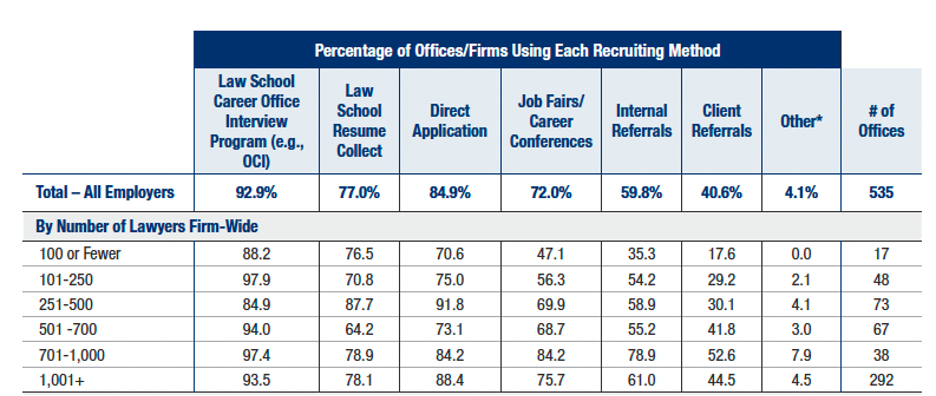Law Firm Hiring Trends: How Are Law Firms Recruiting?
Law Firm Hiring Trends: How Are Law Firms Recruiting Summer Associates?
Here we are going to take a detailed look at law firm hiring trends. And we will answer an an increasingly pressing question: How are law firms recruiting for summer associate positions? Law students, particularly those aiming for the coveted summer associate roles, need to understand the changing landscapes of biglaw hiring practices. Let’s delve into the details, with some insights from the NALP’s latest report (see page 32).

On-Campus Interviewing (OCI): A Staple with Shifting Relevance
The traditional path of OCI remains the cornerstone of recruitment, with 93% of law firms utilizing this method. But don’t let the numbers fool you into complacency. While OCI is a significant component of the recruitment process, the landscape is evolving. If you want a job with a top biglaw firm, it is probably a good idea to not rely on OCI alone. Law firm hiring trends are heading in a different direction.
Direct Application: The Rising Contender in Law Firm Hiring Trends
A notable trend is the surge in law firms adopting direct applications—an impressive 85% overall, leaping to 88.4% in firms boasting over 1,001 lawyers. This marks a strategic shift in talent acquisition, encouraging students to take the initiative rather than waiting around for OCIs.
Please make sure that you look into direct application method, particularly if you are interested in a job at a biglaw firm. (Some of the smaller to midsize firms may rely less on this method right now, but even that will likely shift in future years.)
Law School Resume Collect: A Persistent Player
Another prevalent method is the law school resume collect, engaged by 77% of firms. It offers employers the flexibility to sift through prospects on their timetable and set up interviews on their own.
The Strategy of Elite Firms
What the NALP report doesn’t overtly reveal is that several top-tier biglaw firms are leaning heavily on direct applications. They’re trying to get most of their summer class lined up early and using OCI to round out their summer class (rather than a primary recruitment method). Some of the top biglaw firms report that around 80% of their summer associate class is hired before traditional OCIs. That is a huge number!
So what is the takeaway? By the time OCI rolls around, many premium slots are already filled. If you’ve got your eye on those high-profile firms, early engagement is key.
Firm Size and Recruitment Methods: A Correlation
Notably, smaller firms still favor OCI, possibly due to their more structured recruitment timelines. However, a paradigm shift is on the horizon. We’re likely to witness a broadened embrace of early recruitment tactics, like direct applications, across firms of all sizes in the years ahead.
If you are a law student trying to get a summer associate job, understanding these law firm hiring trends is not just helpful, it is critical. Summer associate recruitment strategies are changing and you will need to adapt if you want to find yourself at an advantage.

This table by NALP (see page 32) illustrates the recruiting methods used by law firms. You can see that most law firms use on campus interviewing (OCI) as a recruitment tool (93%).
However, there is a huge increase in law firms using direct application as a tool. Nearly 85% of law firms used direct application to hire associates. (And in firms of 1,001+ laywers, 88.4% use direct application as a recruiting tool.)
Law school resume collect (where an employer will collect resumes and then choose which students to interview on their own schedule) is also used by 77% of firms.
What is not stated by the NALP report is that several of the top biglaw firms rely heavily on direct application and use OCI only to “round out” their summer class. So if you wait until OCI to apply for a position, it is probably too late if you want a job at those particular firms. At that point, some of the top firms will have filled up most of their spots so you have to stand out even more to earn a position.
Smaller firms tend to rely more on OCI than direct application or other methods. However, we expect to see more firms relying on early recruiting methods (such as direct application) in the coming years.
Seeking Success in Law School?
- Benefit from personalized one-on-one tutoring by our seasoned law school tutors.
- Explore our NEW and highly acclaimed law school study aids, available for a free trial.

